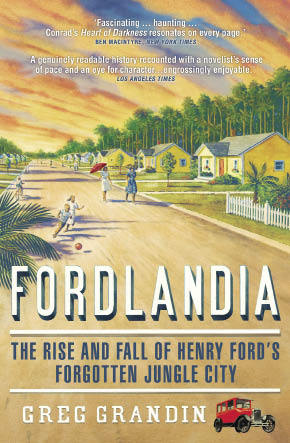The car manufacturer Henry Ford dominates this remarkable book, managing, like Falstaff, to be its tragic hero, villain, and comic relief all at the same time. A gaunt, pacing figure, he conducted interviews while standing, believed in the values of small Main Street America (though his methods of industrial mass production destroyed these), and in pacifism, fitting out a ship to sail to Europe in an attempt to stop the Great War (though later he made billions out of armaments, and had machine-guns mounted on his factories while his paid thugs shot down hunger-marchers).
He believed in many things, in the soy bean, wholemeal bread and unpolished rice; he hated even more, among them booze, Jews, dairy products (he considered cows to be the most inefficient machines on earth) and trade unions. As you might expect, he considered himself, with his factory whistles and time-and-motion surveys, a great force for good in a world he had provided with cheap cars. Nothing seemed beyond a man looked up to by Hitler, Lenin, Trotsky and Mussolini, once described by a Brazilian writer as ‘the Jesus Christ of industry’, a man who declared, ‘Nothing is wrong with anything.’ Only something was.
If his cars were to actually move, they needed tyres, by 1925 50 million of them a year in the United States alone. And tyres were made of rubber. But not just tyres; hoses, valves and gaskets too. The only thing was, an Englishman had stolen the rubber. In 1871, Henry Wickham, who had gone into the jungles of South America hoping to shoot enough tropical birds to supply his mother’s hat shop off Piccadilly Circus, instead stole the seeds on which Brazil’s monopoly of world rubber turned. Queen Victoria knighted him, the seeds, perfected by Kew, were transplanted to Britain’s south east Asia colonies, and by the 1920s this country could exercise price controls on what was virtually the world’s supply, for by then the Brazilian rubber industry had been destroyed. So the American car industry needed an alternative source of supply. But where?
Firestone, behind a barrage of bribery, lighted on Liberia. But Henry Ford was a logical man: rubber had come from Brazil, so out of Brazil it would come again and safeguard his supply forever. Buying 2,500,000 acres, an area the size of an American state, Henry went into the Mato Grosso. Eh? The Mato Grosso, a name familiar to schoolboys of my generation, into which the explorer Colonel Fawcett, hoping to find lost cities, disappeared? The very same. And it was here, over 15 years and an expenditure of tens of millions of pounds, that the dream of the Ford Motor Company also disappeared, which allowed the historian Greg Grandin to have as the subtitle for his book ‘The Rise and Fall of Henry Ford’s Forgotten Jungle City’. Henry, who had given the world the Model T, had given it another lost city to find.
For, being Henry, he had decided to build, not just any settlement, but Main Street USA in the middle of the rain forest; Main Street USA, with its rows of bungalows and neat garden plots, and, which was more important, decided to introduce American work practices. So there were to be golf courses, canteens, serving wholemeal bread and unpolished rice, and factory whistles disturbing the 30-foot snakes, vampire bats, and the rest of the repertory cast of Amazonia. Also cars — for that was the whole point of the exercise — even though here no roads led anywhere, so the cars drove round and round among the lianas. All this with an autonomous bank, schools and police force, so there would virtually be a separate state in the jungle. The only question was . . . where in the Heart of Darkness?
Company men were dispatched, one of whom holed up in the last hotel, where, naked and drunk, his windows wide open, bemused bystanders could watch him copulating with his wife. Others got lost, some cracked up. They hated the heat, they hated the smells, one to the point where he emptied a trading post of its perfumes to chase cows, goats, pigs and chickens, whooping to those he managed to catch, ‘Mr Ford has lots of money, you might as well smell good too.’ Yet, bitten by vipers, arms torn off by crocodiles, amongst the termites and the mosquitoes, they managed to build Fordlandia.
It had all made sense on company plans. Except that Henry took no advice from experts, Henry did not look up to experts (apart from his one idol, the inventor Thomas Edison). So they built the neat rows of bungalows in metal and asbestos, which meant each one became an oven in the tropical heat. They cleared the jungle, sawing up the trees which were expected to show a profit while waiting for the rubber plants to grow, except that the wood was too hard to saw, and Fordlandia so remote, the planks they did manage to cut rotted before they could be floated downstream. Only the plants never did grow. Planted too close together, they died, or they were the wrong kind. And died.
Then there was the Brazilian workforce, who didn’t relish the wholemeal bread and the unpolished rice, storming out of the company’s canteens to unite in a full-scale uprising that it took the country’s army to subdue. In the course of this the rioters smashed every car, truck and tractor, then, pointedly, every clock. For Henry Ford had, of course, introduced time to the rain forest; not only that, the time he had introduced was Detroit time.
The amazing thing is that the black farce lasted the 15 years it did. In 1945 the Ford Motor Company pulled out, not telling the workforce of its intention until the last day. Fordlandia is still there; its few inhabitants keep pigs now. This is an extraordinary story, crisply told, its teller aghast throughout.






Comments